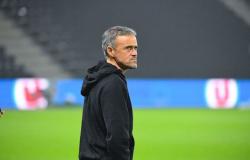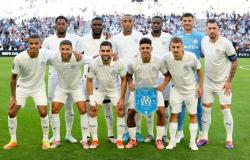Louis Morissette hit hard Friday night on the show It smells like a cut on the airwaves of Cogeco Média. (98.5 FM).
In front of host Mario Langlois and analysts Pierre Gervais and Stéphane Waite, he delivered a real uppercut to the Montreal Canadiens organization.
What he called a “country club” instead of a fair organization based on merit and focused on victory, has taken a hit, and this, with arguments so scathing that it is difficult for him to prove wrong.
Morissette was merciless in denouncing the ambient complacency around the CH.
“I am flabergasted, in good French, at the extent to which we have accepted mediocrity. How generous, optimistic, good-natured people are…”
“We have long said that in Quebec, amateurs were difficult, that the media were difficult. I find that we have become easy, complacent. We accept mediocrity and we shut up.”he said with an anger that reflects the fed-up of several Habs supporters.
For Morissette, this indulgence reflects a dangerous shift, where the team is coddled, not for its successes, but for its simple existence.
He believes that the partisan base, once so critical and demanding, has fallen asleep and now seems to accept mediocrity as the norm.
This feeling of ease which permeates the organization is reflected, according to him, even in the smallest decisions. Let’s take the case of consecutive games, where the simple notion that a goalie cannot string together two games in two nights is accepted without question.
“When they play two games in two nights, we accepted that it’s normal for them to lose… A goalkeeper can no longer score two games in two nights, it’s way too difficult,” he said. ironized.
This perception reinforces his point of view that the team is no longer built to perform well, but to be “managed” gently, without effort to exceed.
Morissette also got to the bottom of the organization’s strategic errors. For him, the management of young players, in particular that of Cayden Primeau, is the perfect example.
Sometimes sent to the stands, sometimes put into play without solid preparation, Primeau is the symbol of shameful management which, instead of maximizing the potential of young talents, seems to slow it down.
And that lack of support seems even more damning in a context where the organization is a complete defensive disgrace.
Stéphane Waite, for his part, supported Morissette, saying that Martin St-Louis may not have the skills necessary to guide the team to the top.
“At some point, if we want to go to another level, I think it will take a coach with more experience,” he admitted.
This comment highlights the growing doubt about St. Louis’ abilities to really take the team to the next level, especially in the face of defensive coaching errors that seem almost untenable for the players.
The question of French-speaking culture within the organization did not escape the discussion, with criticism of the absence of prominent figures who truly embody this culture, a lack of local leadership which once was an integral part of the Canadian DNA.
By mentioning this, Morissette implies that it might be time for the organization, while focusing on its values of diversity and inclusion, to rediscover a cultural base that has long inspired pride and strong identity.
Finally, Morissette did not leave Nick Suzuki out of his sights, criticizing his defensive commitment. He suggested that Suzuki, although captain and key player, is starting to cheat in defense, a worrying sign that perhaps reflects a lack of responsibility and discipline in the room, aspects which should nevertheless be at the heart of the identity of the Habs.
But with Martin St-Louis, the pastoral animator, the party is “stuck”…in the bad sense of the word.
Morissette’s conclusion is clear: the Montreal Canadiens organization today is more of a country club than a professional hockey team.
His words had the effect of an electric shock, and he certainly gave voice to an increasingly important section of supporters who, like him, have stopped believing in the promises of an endless reconstruction plan.
Louis Morissette did not limit himself to criticizing the country club that he perceives within the Montreal Canadiens organization.
He also addressed severe criticism to journalists who, according to him, systematically lie down in front of Martin St-Louis and the organization.
Morissette simply doesn’t understand why the local press seems to spare St. Louis, avoiding the most obvious and crucial questions, like those that every fan asks after every defeat.
What do you mean, after the last game, no journalist asked St. Louis why he sent Dvorak and Armia during the 5 on 3?
For Morissette, this lack of questioning is revealing: while Dvorak and Armia are harmful elements on the ice, their presence at crucial moments is shameful.
However, radio silence from the journalists, a silence which he interprets as proof of complacency and fear of displeasing the organization.
We can also note the absence of questions concerning Arber Xhekaj, who, according to him, is the scapegoat for St. Louis whenever things go wrong.
Why hasn’t anyone asked why Arber Xhekaj is always the one who gets thrown under the bus when Jayden Struble has 15 turnovers a game?
This is a resentment shared by many supporters, who do not understand why Xhekaj is continually penalized while others, like Struble, escape criticism despite his repeated mistakes.
For Morissette, Montreal journalists have lost their independence.
Journalists no longer work for the people. They work for Martin St-Louis and the Montreal Canadiens.
The press prioritizes preserving their access and relationships over objectivity.
This dynamic partly explains why critical voices have knelt before the St. Louis god, leaving supporters in the dark and frustrated by coverage that, far from representing the public’s concerns, seems aimed at preserving the image of the organization.
Morissette touches on the climate of media complacency which fuels the collapse of the CH.
If journalists played their role as “watchdog”, they would remind St. Louis of its contradictions and its questionable choices.
A journalist’s job is to confront…challenge…not lie down.
Ultimately, it is the lack of public accountability that creates and perpetuates the unease around the organization.
Louis Morissette thus painted the portrait of a CH protected from all sides, as much by its own staff as by a press which he accuses of having renounced its critical role and by fans who have become naive in the face of the mediocrity that we accept with our eyes closed.
If the culture of the Canadian must change, this requires a questioning of all the actors, including those who, every evening, report the facts without ever daring to touch the god St-Louis.
Culture also passes through journalists. As long as we continue to treat Martin St-Louis and Kent Hughes like cotton wool…CH will continue to collapse…





